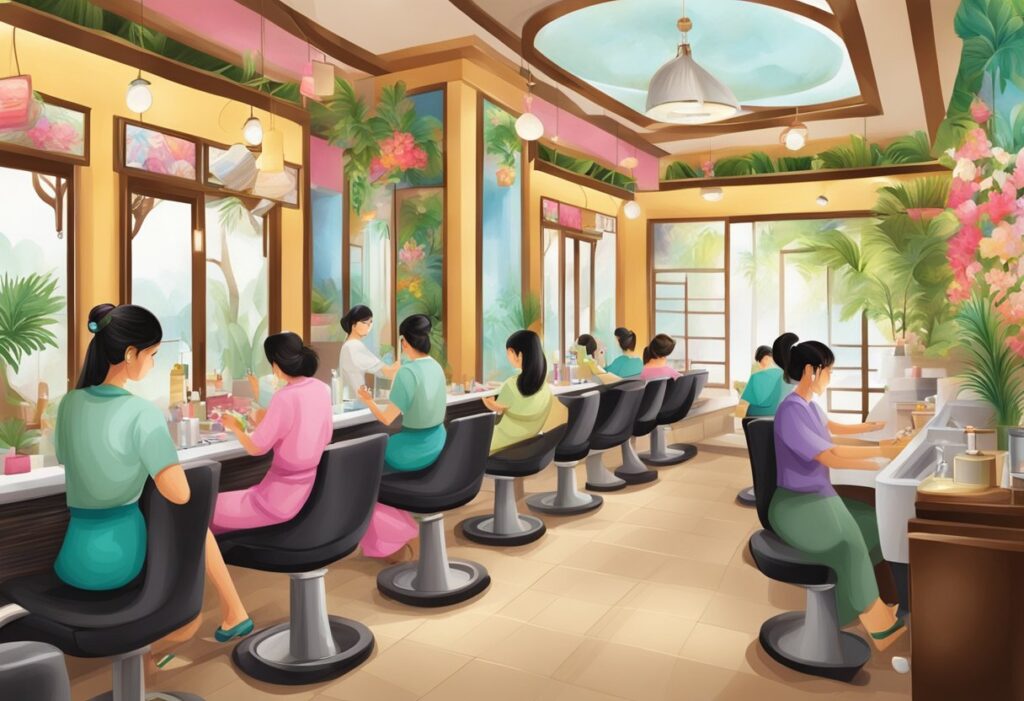Vietnamese Americans own and operate the majority of nail salons in the United States. According to a report by Nails Magazine, over 50% of all manicurists working in nail salons are of Vietnamese descent, despite Vietnamese Americans making up only 0.5% of the U.S. population. This phenomenon has sparked curiosity and questions about why Vietnamese Americans dominate the nail salon industry.

One reason for this trend is the influx of Vietnamese refugees to the United States in the 1970s. Many of these refugees were trained in the beauty industry and found work in nail salons due to the low barriers to entry and flexible work hours. Additionally, the nail salon industry provided an opportunity for Vietnamese immigrants to achieve economic mobility and build a sense of community in a new country.
Another factor contributing to the dominance of Vietnamese Americans in the nail salon industry is the cultural emphasis on beauty and self-care. In Vietnamese culture, appearance is highly valued, and taking care of oneself is seen as a form of respect and self-love. This cultural value has translated into a thriving nail salon industry, where Vietnamese Americans have been able to combine their skills, work ethic, and cultural values to build successful businesses.
Historical Context
Vietnam War and Refugee Exodus
The Vietnamese immigrants who came to the United States and established nail salons were largely refugees of the Vietnam War. The war, which lasted from 1955 to 1975, caused widespread destruction and displacement in Vietnam. Many Vietnamese people fled the country, with a large number ending up in refugee camps in neighboring countries.
After the fall of Saigon in 1975, many Vietnamese refugees were resettled in the United States. The largest group settled in California, where they faced significant challenges in finding work and establishing themselves in a new country. Many turned to the beauty industry, including nail salons, as a means of making a living.
Tippi Hedren’s Influence
Another factor that contributed to the rise of Vietnamese-owned nail salons in the United States was the influence of Hollywood actress Tippi Hedren. In 1975, Hedren visited a California refugee camp and met a group of Vietnamese women who had been trained as manicurists. She was impressed by their skills and decided to help them establish careers in the beauty industry.
Hedren arranged for the women to receive training and licensing, and many of them went on to open their own nail salons. This helped to establish Vietnamese immigrants as a dominant force in the nail salon industry in the United States.
Overall, the rise of Vietnamese-owned nail salons in the United States can be attributed to a combination of factors, including the cultural emphasis on personal grooming in Vietnamese society, the entrepreneurial spirit of Vietnamese immigrants, and the influence of Hollywood celebrities like Tippi Hedren.
Growth of Vietnamese-Owned Nail Salons
Vietnamese-owned nail salons have become a ubiquitous sight in many towns and cities across the United States. In fact, according to a 2015 report by Nails Magazine, 51% of nail salons in the United States are owned by Vietnamese Americans. This begs the question, why are nail salons Vietnamese-owned?
Rise of Entrepreneurial Spirit
The answer to this question can be traced back to the Vietnamese American community’s strong entrepreneurial spirit. Many Vietnamese refugees who fled to the United States following the Vietnam War were forced to start over with nothing. As a result, they turned to entrepreneurship as a means of survival.
Nail salons provided an opportunity for Vietnamese immigrants to start their own business with relatively low start-up costs. According to NPR, “the nail salon industry is one of the few industries that doesn’t require a license to start.” This made it an attractive option for Vietnamese immigrants who lacked formal education or English language skills.
Expansion Across the United States
Vietnamese-owned nail salons first gained popularity in California in the 1970s. Tippi Hedren, an actress and humanitarian, played a key role in helping Vietnamese refugees learn the trade and start their own businesses. Hedren visited a refugee camp in Sacramento and noticed that many of the women there had experience in the nail industry. She arranged for them to receive training and helped them find jobs in the industry.
From there, Vietnamese-owned nail salons began to spread across the United States. Today, they can be found in cities big and small, from New York to Sacramento. Vietnamese entrepreneurs have been able to build successful businesses by offering high-quality services at competitive prices.
In conclusion, the growth of Vietnamese-owned nail salons can be attributed to the Vietnamese American community’s entrepreneurial spirit and the low start-up costs associated with the industry. As a result, nail salons have become a staple of the Vietnamese American community and a thriving industry in the United States.
Cultural and Social Impact
Representation in the Beauty Industry
Vietnamese Americans have made a significant impact on the beauty industry, particularly in the field of nail salons. Today, over half of all nail salons in the United States are owned and operated by Vietnamese Americans. This is a remarkable achievement considering that the Vietnamese community makes up only a small percentage of the total population.
The Vietnamese community’s success in the nail salon industry is due in part to their strong work ethic and entrepreneurial spirit. Many Vietnamese immigrants arrived in the United States with few resources and little education, but they were determined to succeed. They saw the nail salon industry as an opportunity to build a better life for themselves and their families.
Vietnamese American entrepreneurs have also played a significant role in changing the perception of the nail salon industry. In the past, nail salons were often viewed as low-end establishments that catered only to working-class women. However, Vietnamese American nail salon owners have elevated the industry by providing high-quality services and creating a more upscale atmosphere. This has helped to attract a wider range of customers and has helped to improve the industry’s reputation.
Integration with Local Communities
Vietnamese American nail salons have also had a significant impact on local communities. In many areas, nail salons have become a central gathering place for Vietnamese Americans. They provide a sense of community and a place to connect with others who share a similar cultural background.
In addition to serving the Vietnamese community, nail salons have also become popular among other groups, including Asian and Black American women. This has helped to create a more diverse and inclusive beauty industry.
One example of the impact of Vietnamese American nail salons is in Beverly Hills. In the 1980s, Vietnamese American nail salon owners began opening shops in Beverly Hills, which was previously dominated by high-end beauty salons. This helped to democratize the beauty industry and provided working-class women with access to high-quality beauty services.
Similarly, in South Los Angeles, Vietnamese American nail salons have provided job opportunities for Black American women. Many Black American women have found employment in Vietnamese American nail salons, which has helped to improve their economic status.
Overall, Vietnamese American nail salons have had a significant cultural and social impact on the United States. They have helped to create a more diverse and inclusive beauty industry and have provided job opportunities and economic mobility for Vietnamese Americans and other marginalized groups.
Industry Challenges and Criticism

Despite the success of Vietnamese-owned nail salons, the industry has faced several challenges and criticisms. This section will explore some of the most common ones.
Working Conditions and Health Concerns
One of the most significant criticisms of the nail salon industry is the poor working conditions and health concerns faced by workers. According to a report by NBC News, many workers are exposed to toxic chemicals that can cause respiratory problems, skin irritation, and other health issues. Additionally, workers often work long hours for low wages, which can lead to burnout and exhaustion.
Economic Pressures and Competition
Another challenge facing the Vietnamese-owned nail salon industry is economic pressures and competition. As the industry has grown, more and more salons have opened, leading to increased competition and lower prices. This has put pressure on salon owners to offer discounted services, which can lead to decreased profits and lower wages for workers.
To compete in this crowded market, many salons have resorted to cutting corners, such as using cheaper products or not following proper sanitation protocols. This has led to concerns about the safety and quality of services provided by some salons.
Despite these challenges, Vietnamese-owned nail salons continue to dominate the industry. While there is certainly room for improvement, the success of these salons is a testament to the hard work and entrepreneurship of Vietnamese immigrants.
The Future of Nail Salons

As the nail salon industry continues to thrive, it is important to consider what the future holds for this $8 billion industry. Vietnamese entrepreneurs have played a significant role in the growth and success of nail salons in the United States, but what will the industry look like in the years to come?
Innovation and Education
Innovation and education will be key factors in the future of nail salons. The beauty industry is constantly evolving, and it will be important for nail technicians to stay up-to-date with the latest techniques and trends. Advance Beauty College is one institution that is dedicated to providing education and training for those interested in pursuing a career in the beauty industry. By investing in education and training, nail technicians can provide their clients with the latest and greatest in nail care.
Community and Legacy
Community and legacy are also important factors to consider when thinking about the future of nail salons. Many Vietnamese-owned nail salons are family-owned and operated, passed down from generation to generation. These salons are often intimate spaces where clients can feel pampered and cared for. It will be important for future nail salons to continue this tradition of community and legacy, while also adapting to the changing needs and desires of clients.
Overall, the future of nail salons is bright. As the beauty industry continues to grow and evolve, so too will nail salons. By embracing innovation and education, and staying true to the community and legacy of Vietnamese-owned nail salons, the industry will continue to thrive for years to come.
